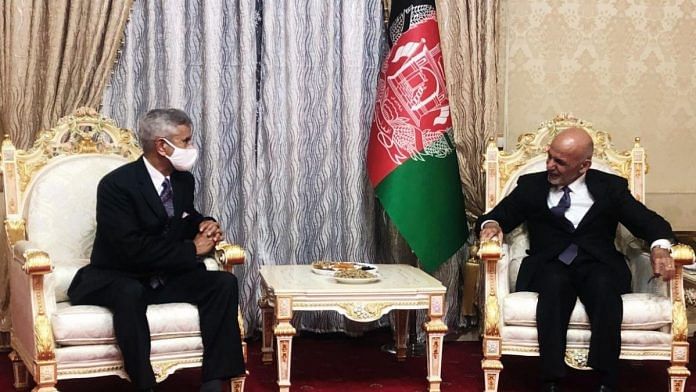New Delhi: In late June, India, as head of the Taliban Sanctions committee at the UN Security Council, assented to a US request to exempt 14 Afghan Taliban leaders from a travel ban, thereby allowing them to participate in “peace and reconciliation” discussions abroad.
The decision to extend the travel exemption for Taliban leaders like Mullah Baradar and Sher Abbas Stanekzai for three more months is one step in a complex web of initiatives New Delhi is planning to keep itself relevant in the fast-evolving Afghanistan situation.
As the US prepares to leave after 20 long years and the Taliban occupy new territory every day in its relentless push towards Kabul, India has been engaging with key neighbours of Afghanistan as well as influential players such as Iran, the US and Russia.
New Delhi has decided to send a senior Cabinet minister to the swearing-in ceremony of Iran’s president-elect Ebrahim Raisi on 5 August. This comes on the heels of External Affairs Minister S. Jaishankar’s exceptionally warm meeting with the new president in Tehran last week.
Jaishankar is planning a Central Asia swing this week, with visits to Tashkent and Dushanbe to participate in a key Connectivity Summit and a foreign ministers’ meeting of the Shanghai Cooperation Organisation. The trips follow his meetings with US special envoy Zalmay Khalilzad in Doha and Russian foreign minister Sergey Lavrov in Moscow in recent days.
Indian officials say they are keenly aware of the complex situation in Afghanistan, especially amid the rapid US exit and Russia’s determination to mend fences with Pakistan, and thereby with the Taliban, who remain hugely influenced by Pakistan’s military establishment.
New Delhi has sought to open the door to the Taliban as well, even as it continues to back elected Afghan President Ashraf Ghani.
The decision to accede to the US request on the Taliban leaders’ travel is believed to be part of this game-plan.
Also read: India prepares contingency plan as Taliban gain ground, evacuates staff from Kandahar consulate
Number of plans
Significantly, while the US request was backed by all permanent (P-5) as well as non-permanent members of the Security Council, the Afghan government had sought to limit the Taliban’s travel to Doha — where Taliban leaders have been travelling since last year for talks on the peace process with the US — as well as Istanbul, where a conference to take the peace process forward and begin an “intra-Afghan dialogue” is likely to take place soon.
Indian officials argue that the travel exemptions have been made since 2019, when the US first began talks with the Taliban, so India inherited the job when it took chairmanship of the committee in January.
But Delhi accepting the US’ request to allow the Taliban leaders to travel to other parts of the world has meant that Sher Mohammed Stanekzai, deputy leader of the Taliban negotiating team, led a delegation of talks with representatives of Ashraf Ghani, Hamid Karzai and Marshal Dostum, in Iran last week — exactly on the same day Jaishankar stopped over to meet Raisi.
While in Moscow, Taliban leader Shahabuddin Delawar, also on the travel ban exempt list, told Russian officials that “our territory will never be used against our neighbours.”
In what seems to be an extraordinary coincidence, Jaishankar was in Moscow the day after the Taliban arrived there for their talks.
There has been much speculation that Jaishankar and his team have interacted with senior Taliban leaders like Mullah Baradar, but the government has vehemently denied the rumours.
(Edited by Arun Prashanth)
Also read: Georgia moved as Jaishankar brings home a 17th-century queen killed for refusing conversion



